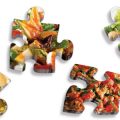Are You Nuts About NUTS, BERRIES AND OILS?
By Janis Roszler, RD, CDE, LD/N
Nuts, berries and oils seem to be in the news a lot lately, thanks to the health benefits that they provide. Here is a quick review of each of those foods, along with some new ways they can help your diabetes control.
Nuts
Walnuts, almonds, hazelnuts and most other types of nuts are great for your heart. They help lower LDL (bad) cholesterol levels, prevent harmful heart rhythms from forming and contain L-arginine, which can help artery walls “relax.” That can help prevent clogged arteries, chest pain and possibly heart disease.
What’s new?
Nuts to the rescue. A recent Canadian study found that nuts not only help improve cholesterol levels, they can also help improve blood glucose levels. If you have type 2 diabetes, you know that if you eat too many carbohydrate-rich foods— pasta, rice, bread, cookies, potatoes, corn, peas, milk, fruit or fruit juice— your blood glucose will go too high.
In that study, researchers mixed unsalted almonds, peanuts, cashews, macadamia nuts, pistachios, hazelnuts, pecans and walnuts together. The subjects, who ate 2 ounces of the nut mixture each day in place of some of their carbohydrates, enjoyed a nice drop in their A1C. The A1C is a blood test that tells you how well your diabetes has been controlled for the past three months. People with diabetes have a lower risk of complications if they keep their A1C level below 7 percent.
Note: While eating more nuts can be helpful, don’t overdo it. Nuts are high in fat and calories and can cause you to gain weight if you eat too many of them.
Berries
Berries, such as straw-berries, blueberries, raspberries and cranberries, are rich in antioxidants, substances that fight damage caused by toxic byproducts (free radicals). Some of these byproducts come from natural cell processes in the body, while others come from environmental sources, such as cigarette smoke, pesticides and sunlight.
What’s new?
If you have type 2 diabetes and eat an antioxidant-rich diet, you may find it easier to keep your blood glucose level in a healthy range. That’s because the antioxidants can improve your body’s response to insulin. Experts in Italy who observed that benefit also believe that an antioxidantrich diet can also help metformin, a common diabetes medicine, work better in the body. They suggest that people with diabetes eat five servings of fruits and vegetables daily to help improve their insulin levels. In addition to berries, carrots, capers, tomatoes, orange juice and tea are also good sources of antioxidants.
Note: Fruits and fruit juices will raise your blood glucose level if eaten in excess. If you add them to your diet, count the carbs and check your blood glucose regularly. Adjust your intake of fruit and fruit juices, as needed, based on your blood glucose response.
Oils
There are four types of fats: two that harm and two that help. The harmful ones are saturated fats and trans fats. Saturated fats, found, for example, in red meat and high-fat dairy products, raise your risk of getting heart disease and type 2 diabetes. Trans fats are often found in stick margarines, shortenings and baked goods. A quick glance at a food’s Nutrition Facts label will tell you if a product contains that type of fat. Trans fats should be limited, as they raise the body’s LDL cholesterol level and increase the risk of heart disease. Try to choose foods with 0 grams of trans fat per serving.
Polyunsaturated and monounsaturated oils are the healthy oils. They are found in nuts, fish and vegetable oils, such as olive, safflower, canola and sunflower oils. They don’t seem to raise LDL cholesterol and may even help bring it down. When you cook at home or dress your salads, use these healthier oils.
What’s new?
Fish oils are great for your heart, but did you know that they can also help keep your mouth healthy? People with diabetes have a higher risk of gum disease, which can make it harder for them to control their blood glucose level. Fish oils, found in salmon, sardines, mackerel, swordfish and other fatty fish, may help prevent gum disease. The oils that seemed to offer the most help are the omega-3 fatty acids DHA and EPA. Experts don’t know exactly how much fish will help, but they suggest that people who have diabetes eat fatty fish at least twice a week.
Note: Be sure to limit the amount of oil you use. All oils are high in fat and calories and may lead to weight gain if you use too much.













